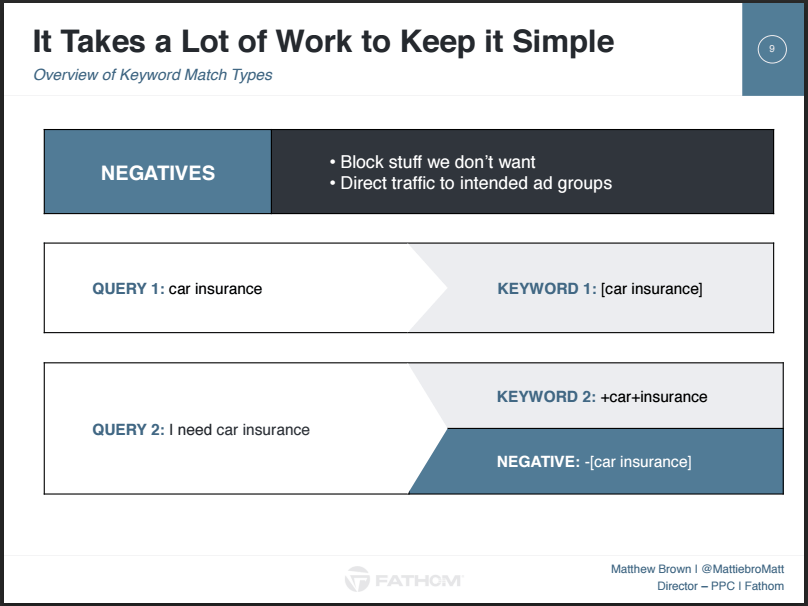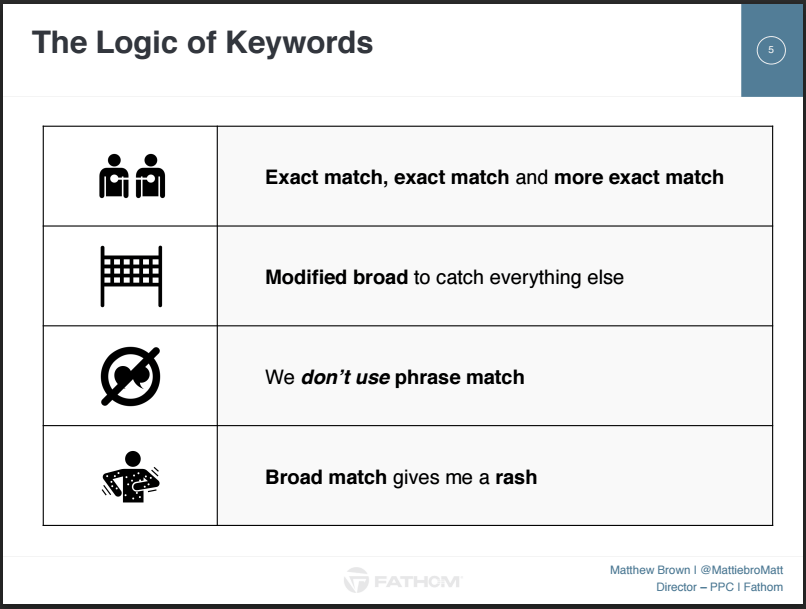Deciding on what keywords to include in an AdWords campaign takes work. Do not screw up your ROI because keyword match type was never a priority.
Avoid Wasted Spend
After years of being in this industry it still surprises me how many AdWords accounts we inherit have all of the keywords set to broad match. And better yet – there are no negative keyword lists!
What’s the problem? When you create a campaign, Google sets keywords as broad match by default. As a result, you, the advertiser, end up spending more because your carefully thought out keyword list now triggers your ad for incredibly irrelevant search queries.
Unless resources are devoted to obsessing over the search queries report to meticulously add any irrelevant queries to a negative keyword list, the broad match type is dangerous. Thousands of dollars could be wasted on clicks from people looking for things you do not sell. If your keywords are set as “broad” and negative keyword research is not occurring, you can kiss your ROI goodbye!
Avoid Limiting Yourself
Phrase match is another popular keyword match type. This match type allows the advertiser to become more focused because the searcher must use those exact keywords in that exact order before an ad will trigger.
Trouble is Google reports that globally there are about 495 million new queries (“new” meaning never yet searched in the history of Google) each day! Expecting to capture all relevant search volumes by using solely phrase match can quickly make an account very large and unmanageable.
What Match Type is Right for Me?
There are many theories on how best to structure a campaign. While at HeroConf this year, Matthew Brown from Fathom led a session on how he does not believe in running phrase match keywords. The theory is that an exact match only keyword structure coupled with a carefully monitored broad modified match type will capture all relevant traffic. Intrigued, we decided to test Brown’s theory.

Note: Broad modified is a match type that requires the searcher to use those specific keywords but not in any particular order. These keywords have + symbols in front of each term. It is different than broad.
Test the Theory
We tested the theory via AdWords Experiments before rolling out a campaign level change. As the data below shows, we found this strategy improved ROI for our B2B clients focused on lead generation and contact form submissions.
Test Example #1

Campaigns received a 50/50 split of traffic. In the Exact Match coupled with Broad Modified keywords campaign, we reported better click through rates, improved conversion rates (because the traffic was more qualified) and ultimately a lower cost per converted click. We applied the draft and this is no longer an experiment – this has become the new standard!

Test Example #2
Within another client’s account we ran a similar test. Data is still being collected as statistical significance has not been reached, but again we see improvements over the control when the ad group structure supports exact match coupled with broad modified.

Above shows better click through rates, lower cost per click, better conversion rate, and ultimately a lower cost per converted click in the experiment compared to the control.
Walk Before You Run!
There are many things a PPC strategist must consider before deploying this type of campaign. For example…
- Negatives must be set up at ad group levels
- Keyword bids must make sense for the varying degrees of intent these match types carry
- Any automated rules must be applied to both campaigns while testing to create an apples to apples comparison
- Campaign history must be gradually accumulated during a restructure
…and so on, or you could risk poor performance due to ad rank.
Summary
During our tests we showed success for our B2B clients, but we recommend having an expert review your account before deploying massive changes such as this. Depending on your reach and budget, restructuring a campaign could have massive impact on ROI.
Need a hand with PPC? We’ve been at it since the beginning. Check out our PPC capabilities.
